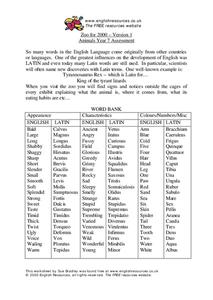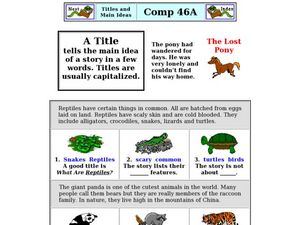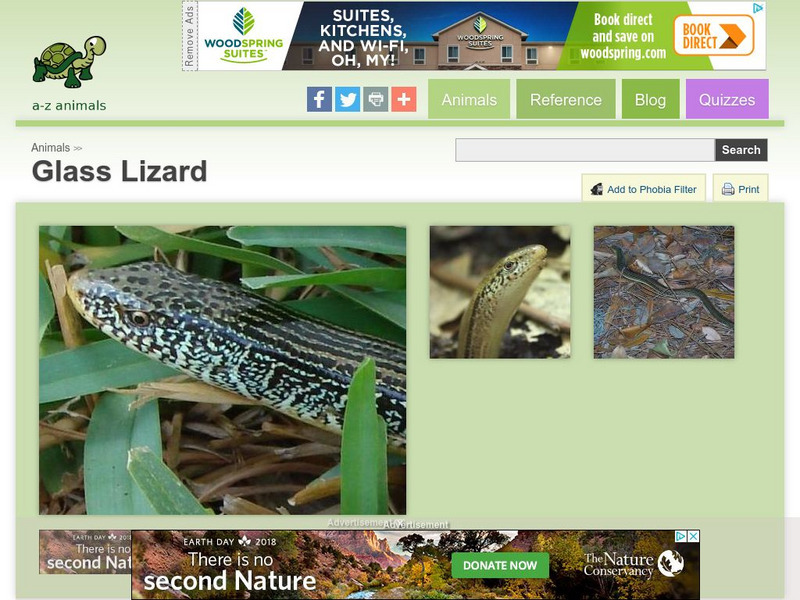Curated OER
How to Keep Warm in the Arctic!
Learners simulate the differences between animals protected by fat and those that aren't. They fill one of the mugs with shortening. Students cut a small hole, and place a thermometer in each piece of cardboard. They position the bulb of...
Curated OER
Sliding Along
Third graders use a ruler that has a bag tie slider attached to it to measure a number of items. While measuring, they complete a "Sliding Along" worksheet and a "Sliding Synthesis Journal." In the journal entry, they include what they...
Curated OER
Create a Dichotomous Key of Idaho Reptiles
Students use the reptile section of the Digital Atlas of Idaho. They make a dichotomous key and decide on what defining characteristics they can use to distinguish between species. They hone their observation skills and recognize...
Curated OER
Zoo Animals
In this zoo animals worksheet, students create five new animals and write the zoological descriptions of them following a detailed description on how to complete the assignment. Students practice using Latin words and find the animals...
Curated OER
Plural Nouns: 3
In this plural noun learning exercise, students form the plural of 9 nouns by adding "s" or "es." Nouns appear in a word box, 1 example is given.
Curated OER
Reptile Crossword
In this crossword puzzle worksheet, students read the clues and complete the crossword puzzle with vocabulary about reptiles. Students complete 17 clues.
Curated OER
Crocodile Eyes
Students investigate the eyes and eyelids of reptiles and amphibians. In this animal biology instructional activity, students listen to a lecture on the characteristics of amphibians and reptiles and complete a crocodile eyelid activity...
Curated OER
Learning about Titles
In this title worksheet, students read titles, then fill in blanks after reading short passages, selecting a title and then filling in facts.
Curated OER
Animals Spiral Puzzle
In this animal puzzle learning exercise, students use a set of 8 clues about animals to complete a spiral puzzle. A reference web site is included for additional activities.
Curated OER
New York State Testing Program English Language Arts Book 1--Grade 7 (2006)
In this New York State Testing Program English Language Arts worksheet, students read several passages and two poems and answer reading comprehension questions. Students then write an essay response to one of the passages.
Curated OER
Reptile and Amphibian Conversions
In this conversion worksheet, students read about given reptiles and amphibians and converts lengths and weights as instructed.
PBS
Pbs Learning Media: Wild Kratts: All About Lizards Lesson Plan
Students explore the diversity of lizards in terms of characteristics, behavior, and habitat. Activities feature five species of lizards and their special body structures needed for survival.
Howard Hughes Medical Institute
Hhmi: Bio Interactive: Lizard Evolution Virtual Lab
Students explore the evolution of the anole lizard in this virtual lab. Students will collect and analyze data during the virtual lab that focuses on evolutionary biology and includes adaptation, convergent evolution, phylogenetic...
San Diego Zoo Global
San Diego Zoo: Lizard
This resource provides extensive information about lizards, including photos and an audio clip.
CK-12 Foundation
Ck 12: Life Science: Lizards and Snakes
[Free Registration/Login may be required to access all resource tools.] Lizards and snakes belong to the largest order of reptiles, Squamata. Lizards are a large group of reptiles, with nearly 5,000 species, living on every continent...
A-Z Animals
A Z Animals: Animal Facts: Frilled Lizard (Chlamydosaurus Kingii)
This entry identifies the defining characteristics of the Chlamydosaurus Kingll, otherwise known as the frilled lizard.
A-Z Animals
A Z Animals: Animal Facts: Glass Lizard (Ophisaurus)
This entry identifies the defining characteristics of Ophisaurus, more commonly known as the Glass Lizard.
A-Z Animals
A Z Animals: Animal Facts: Caiman Lizard (Dracaena Guianensis)
Illustrated entry describes the Caiman Lizard along with providing details about their habitat, physical characteristics, predatory lifestyle, and breeding.
A-Z Animals
A Z Animals: Animal Facts: Lizard (Lacertilia)
Presents an overview of Lizards, including their habitat, appearance, behavior, and breeding. Images of this species and statistics can also be found here.
A-Z Animals
A Z Animals: Animal Facts: Monitor Lizard (Varanus Indicus)
Explore images and facts about the Monitor Lizard, including details on its appearance, habitat, breeding, diet, behavior, and much more.
A-Z Animals
A Z Animals: Animal Facts: Sand Lizard (Lacerta Agilis)
Provides photographs and a fact card about the sand lizard. Discusses where they are found, physical characteristics, lifestyle, diet, predators, reproductive behavior, and population decline from loss of habitat.
Denver Zoo
Denver Zoo: Frilled Lizard
The Denver Zoo features a comprehensive overview of the frilled lizard focusing on its habitat, range, adaptations, diet, physical characteristics, and more.
CK-12 Foundation
Ck 12: Life Science: 10.12 Lizards and Snakes
Explore the characteristics and behaviors of lizards and snakes.
Science Buddies
Science Buddies: Where Do Lizards Go for Lunch?
You've probably heard about differences between the left brain and the right brain in people. One hypothesis has it that brain lateralization evolved as a survival mechanism in animals with eyes on the sides of their heads. One eye could...
Other popular searches
- New Zealand Lizards
- Lizards Adaptations
- Lizards for Lunch
- New Zeal and Lizards
- Leaping Lizards
- Flying Lizards
- Lizards and Snakes
- Food Chain/ Lizards
- Lizards Snakes
- Northern Alligator Lizards
- Lizards of Mississippi
- Food Chains/ Lizards






















